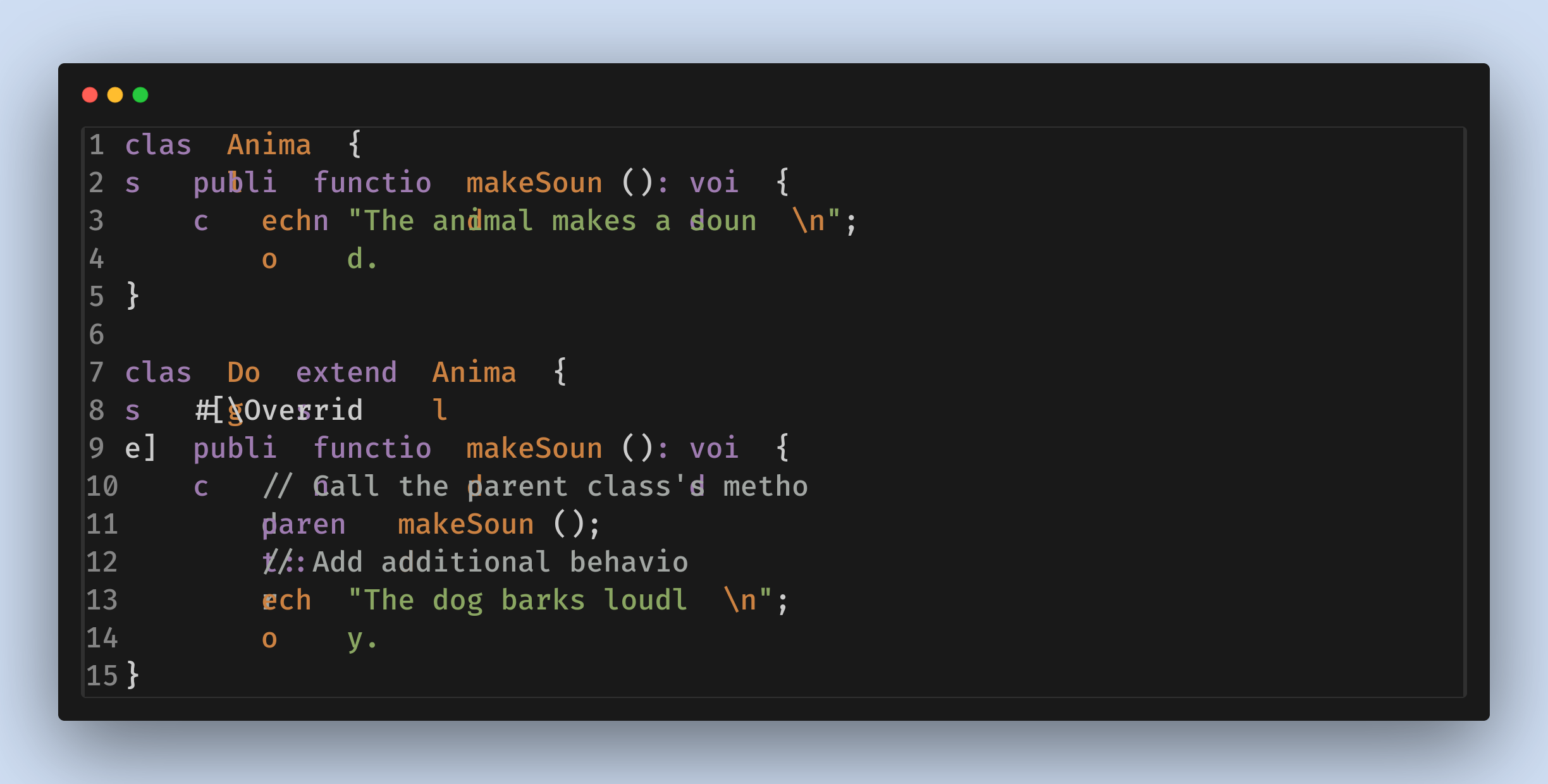With PHP 8.1, the introduction of attributes has opened new ways to work with object-oriented programming (OOP) features. One such feature is the #[\Override] attribute, which adds clarity to method overriding in PHP. While method overriding allows a child class to redefine a method inherited from a parent class, using the #[\Override] attribute ensures that developers explicitly declare their intention to override a parent method. This attribute not only improves code readability but also adds safeguards against accidental errors in method names or signatures.
In this blog, we will explore the concept of method overriding in PHP, enhanced by the #[\Override] attribute, using the latest PHP syntax and best practices.
What is Method Overriding in PHP?
Method overriding allows a child class to provide its own implementation of a method that is already defined in the parent class. This feature helps create dynamic and flexible code where child classes can adapt inherited methods to suit their specific needs.
By using the #[\Override] attribute, PHP allows you to declare explicitly that a method in a subclass is intended to override a method from the parent class. This improves readability and provides a layer of safety by signaling to the PHP engine that the method is indeed overriding an inherited one. If a method is declared with #[\Override] but doesn't actually override a parent method, PHP will throw an error, preventing potential bugs caused by mistyping method names.

Basic Example of Method Overriding with #[\Override]
Let's consider a simple example using the #[\Override] attribute. Here, we will have a base class Animal and a subclass Dog that overrides the makeSound() method.
<?php
class Animal {
public function makeSound(): void {
echo "The animal makes a sound.\n";
}
}
class Dog extends Animal {
#[\Override]
public function makeSound(): void {
echo "The dog barks.\n";
}
}
$animal = new Animal();
$animal->makeSound(); // Outputs: The animal makes a sound.
$dog = new Dog();
$dog->makeSound(); // Outputs: The dog barks.
In this example:
- The
Animalclass defines amakeSound()method. - The
Dogclass overrides themakeSound()method and uses the#[\Override]attribute to declare its intent to override the method from the parent class. - If the method signature doesn’t match or the method name is misspelled, PHP will throw an error, ensuring the integrity of the overridden method.
Importance of the #[\Override] Attribute
The #[\Override] attribute provides several benefits in PHP:
Improved Code Clarity
By explicitly marking overridden methods with #[\Override], it becomes immediately clear to anyone reading the code that the method is inherited from a parent class and modified. This makes the code easier to understand, especially in large projects or when working with teams.
Prevention of Mistakes
One common source of errors in OOP is mistakenly misspelling a method name or altering the method signature while intending to override a parent class method. The #[\Override] attribute helps catch such errors by ensuring that the method you're trying to override actually exists in the parent class.
Consistency Across Inheritance
When working with long class hierarchies, it becomes important to track which methods are being overridden. Using the #[\Override] attribute ensures consistency across the inheritance chain and prevents accidental method redefinitions.
Calling Parent Methods with parent:: and #[\Override]
In many cases, you might want to extend the functionality of a method while keeping part of the parent class’s implementation intact. This can be done using parent:: to call the parent’s method inside the overridden method, while also utilizing the #[\Override] attribute to ensure that the method is correctly overriding a parent method.
<?php
class Animal {
public function makeSound(): void {
echo "The animal makes a sound.\n";
}
}
class Dog extends Animal {
#[\Override]
public function makeSound(): void {
// Call the parent class's method
parent::makeSound();
// Add additional behavior
echo "The dog barks loudly.\n";
}
}
$dog = new Dog();
$dog->makeSound();
// Outputs:
// The animal makes a sound.
// The dog barks loudly.
In this example:
- The
Dogclass overrides themakeSound()method and calls the parent’s method usingparent::makeSound(). - The
#[\Override]attribute ensures that PHP knows the method is intentionally overriding one from theAnimalclass.
Real-World Use Cases of Method Overriding with #[\Override]
Method overriding is widely used in real-world applications, especially in scenarios where flexibility and extensibility are required. Here are some practical use cases:
Design Patterns
Overriding methods is a core feature in many design patterns like the Strategy Pattern or the Template Method Pattern, where subclasses provide their own implementation of inherited methods.
<?php
class PaymentMethod {
public function processPayment(float $amount): void {
echo "Processing payment of \${$amount} via default method.\n";
}
}
class PayPalPayment extends PaymentMethod {
#[\Override]
public function processPayment(float $amount): void {
echo "Processing payment of \${$amount} via PayPal.\n";
}
}
class CreditCardPayment extends PaymentMethod {
#[\Override]
public function processPayment(float $amount): void {
echo "Processing payment of \${$amount} via Credit Card.\n";
}
}
function processTransaction(PaymentMethod $paymentMethod, float $amount): void {
$paymentMethod->processPayment($amount);
}
$paypal = new PayPalPayment();
$creditCard = new CreditCardPayment();
processTransaction($paypal, 100.0); // Outputs: Processing payment of $100 via PayPal.
processTransaction($creditCard, 150.0); // Outputs: Processing payment of $150 via Credit Card.
In this example, PayPalPayment and CreditCardPayment override the processPayment() method from the PaymentMethod class, and the #[\Override] attribute ensures that PHP properly tracks the overridden methods.
Conclusion
Method overriding is a fundamental feature in PHP's object-oriented programming model, and the introduction of the #[\Override] attribute in PHP 8.1 adds an extra layer of clarity and safety. By explicitly marking methods as overrides, developers can prevent common mistakes, improve readability, and ensure consistency across class hierarchies.
When used effectively, method overriding—coupled with the #[\Override] attribute—empowers you to create flexible, extensible, and maintainable PHP applications. This feature is especially useful in scenarios where inheritance plays a critical role, such as framework development, design pattern implementation, and code customization.
By leveraging the power of the #[\Override] attribute, you can write cleaner, safer code that adheres to modern PHP standards, enhancing both the robustness and maintainability of your projects.
